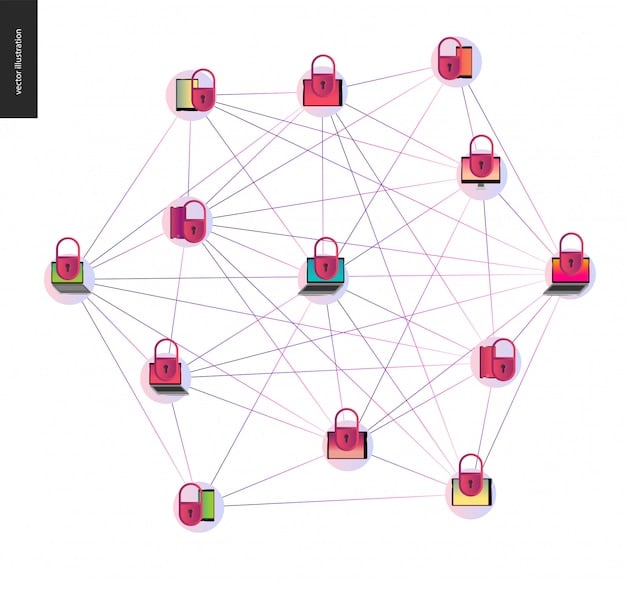What are the Key Changes in US Data Privacy Policy Taking Effect in the Next 3 Months?

What are the key changes in US data privacy policy taking effect in the next 3 months? They involve enhanced consumer rights, stricter data processing rules for businesses, and increased enforcement by state and federal agencies. These changes aim to provide greater transparency and control over personal data.
Navigating the complex landscape of US data privacy can be challenging, especially with evolving regulations. Over the next three months, significant changes are set to reshape how businesses handle consumer data. Understanding these shifts is crucial for compliance and maintaining consumer trust.
Are you ready to adapt to the upcoming changes in US data privacy policy? This article provides a comprehensive overview of the key updates taking effect in the next three months, helping you stay informed and prepared.
Understanding the Evolving Landscape of US Data Privacy
The digital age has brought unprecedented opportunities, but also significant challenges in protecting personal data. As technology advances, so too must the laws and regulations that govern how data is collected, used, and shared.
In the United States, data privacy is not governed by a single, comprehensive federal law. Instead, it’s a patchwork of federal and state laws, each addressing specific aspects of data protection. This decentralized approach makes compliance complex, but also allows for innovation and tailored solutions to local needs.
The Current State of Data Privacy in the US
Currently, several key laws and frameworks shape data privacy in the US. The Health Insurance Portability and Accountability Act (HIPAA) protects health information, while the Children’s Online Privacy Protection Act (COPPA) safeguards children’s data online. The California Consumer Privacy Act (CCPA) and its amendment, the California Privacy Rights Act (CPRA), have set a high standard for consumer rights, influencing other states to follow suit.
- HIPAA: Protects individuals’ medical records and other personal health information.
- COPPA: Requires verifiable parental consent for the collection and use of personal information of children under 13.
- CCPA/CPRA: Grants California residents significant rights over their personal data, including the right to know, the right to delete, and the right to opt-out of the sale of their data.
These laws represent a growing recognition of the importance of data privacy and the need for stronger consumer protections. However, the landscape is constantly evolving, with new legislation and court decisions shaping the future of data privacy in the US.
As we look ahead to the next three months, several key changes are poised to take effect, promising to further enhance consumer rights and strengthen data protection measures. Understanding these upcoming changes is essential for businesses and consumers alike.
What are the Key Changes in US Data Privacy Policy Taking Effect in the Next 3 Months?
The next three months are set to bring significant updates to US data privacy policies, largely focused on enhancing consumer rights and tightening regulations around data processing. These changes are influenced by ongoing legislative efforts and evolving interpretations of existing laws.
What are the key changes in US data privacy policy taking effect in the next 3 months? They involve a mix of new state laws coming into effect, enhanced enforcement by federal agencies, and evolving best practices for data handling. Let’s delve into these changes.
New State Laws Coming into Effect
Several states have recently passed comprehensive data privacy laws that will take effect in the coming months. These laws often mirror elements of the CCPA/CPRA, granting residents similar rights over their personal data.
States like Virginia, Colorado, and Utah have enacted their own comprehensive data privacy laws. The Virginia Consumer Data Protection Act (CDPA) and the Colorado Privacy Act (CPA) grant consumers rights to access, correct, and delete their personal data, as well as the right to opt-out of targeted advertising and the sale of their data. The Utah Consumer Privacy Act (UCPA) takes a more business-friendly approach but still establishes fundamental consumer rights and obligations for businesses.
- Virginia Consumer Data Protection Act (CDPA): Grants consumers rights to access, correct, and delete their data.
- Colorado Privacy Act (CPA): Offers similar rights as the CDPA, with additional provisions for data minimization.
- Utah Consumer Privacy Act (UCPA): Establishes fundamental consumer rights but with a more business-friendly approach.

These state laws not only impact businesses operating within those states but also have broader implications for companies across the US. Compliance with these laws often requires businesses to implement robust data privacy programs that can adapt to varying state requirements.
Therefore, businesses need to closely monitor the effective dates of these laws and ensure they have the necessary policies and procedures in place to comply.
Enhanced Enforcement by Federal Agencies
Federal agencies are also stepping up their enforcement of existing data privacy laws. The Federal Trade Commission (FTC) and the Department of Health and Human Services (HHS) are actively pursuing companies that violate consumer privacy rights.
What are the key changes in US data privacy policy taking effect in the next 3 months regarding enforcement? Federal agencies like the FTC are increasing their scrutiny of companies’ data handling practices, with a particular focus on deceptive or unfair practices.
Recent Enforcement Actions
The FTC has recently taken action against companies for allegedly violating the COPPA rule, misrepresenting their data security practices, and failing to protect consumer data from unauthorized access. These actions send a strong message to businesses that data privacy is a priority for federal regulators.
- Increased Scrutiny: The FTC is intensifying its review of companies’ data handling practices.
- COPPA Violations: Companies are being held accountable for failing to comply with COPPA.
- Data Security Practices: Businesses are facing penalties for misrepresenting their data security measures.
The HHS is also actively enforcing HIPAA, particularly in cases involving breaches of protected health information. These enforcement actions underscore the importance of safeguarding sensitive health data and complying with HIPAA requirements.
Businesses should expect continued scrutiny from federal agencies and should proactively review their data privacy practices to ensure compliance with applicable laws and regulations.
Adapting to New Data Handling Best Practices
In addition to legal and regulatory changes, best practices for data handling are also evolving. Consumers are increasingly demanding greater transparency and control over their personal data, prompting businesses to adopt more privacy-friendly approaches.
Companies are recognizing that data privacy is not just a compliance issue, but also a competitive differentiator. By prioritizing data privacy and adopting transparent data handling practices, businesses can build trust with consumers and gain a competitive advantage.
Implementing Privacy-Enhancing Technologies (PETs)
PETs are technologies that enable businesses to process data while minimizing the risk of compromising individual privacy. These technologies include techniques like data anonymization, differential privacy, and secure multi-party computation.
- Data Anonymization: Modifying data to remove personally identifiable information.
- Differential Privacy: Adding noise to data to protect individual privacy while still enabling data analysis.
- Secure Multi-Party Computation: Allowing multiple parties to compute on data without revealing their individual inputs.
By implementing PETs, businesses can demonstrate their commitment to data privacy and build trust with consumers. These technologies can also help businesses comply with data minimization principles, reducing the amount of data they collect and retain.
Adopting privacy-enhancing technologies is becoming increasingly essential for businesses that want to stay ahead of the curve and demonstrate a genuine commitment to data privacy.

Preparing for the Future of US Data Privacy
As we look beyond the next three months, the future of data privacy in the US is likely to be shaped by several key trends. These include the potential for a comprehensive federal data privacy law, the continued rise of state-level regulation, and the growing importance of international data transfers.
Businesses need to stay informed about these trends and proactively adapt their data privacy practices to meet evolving requirements. This includes investing in data privacy training for employees, implementing robust data security measures, and developing transparent data handling policies.
The Potential for a Federal Data Privacy Law
The US remains one of the few developed countries without a comprehensive federal data privacy law. However, there is growing momentum behind the effort to enact such a law, which would provide a uniform standard for data protection across the country.
A federal data privacy law could preempt state laws, providing businesses with greater certainty and reducing the complexity of compliance. However, it could also impose stricter requirements than some state laws, requiring businesses to make significant changes to their data privacy practices.
- Uniform Standards: A federal law could create consistent data protection standards across the US.
- Preemption of State Laws: A federal law could simplify compliance by preempting state regulations.
- Stricter Requirements: A federal law could impose more stringent data privacy obligations on businesses.
Businesses should closely monitor the progress of federal data privacy legislation and prepare for the possibility of a new legal framework that could significantly impact their data handling practices.
In conclusion, staying ahead of the curve in data privacy requires constant vigilance and a proactive approach. By preparing for the changes taking effect in the next three months and beyond, businesses can ensure compliance, build trust with consumers, and gain a competitive advantage in the digital age.
Key Takeaways and Actionable Steps
To successfully navigate the upcoming changes in US data privacy policy, businesses should focus on several key areas. Understanding these changes is vital for maintaining compliance and fostering consumer trust.
**What are the key changes in US data privacy policy taking effect in the next 3 months** that businesses should prioritize? These include complying with new state laws, enhancing data security measures, and embracing privacy-enhancing technologies.
Actionable Steps for Businesses
Here are some actionable steps businesses can take to prepare for the upcoming changes:
- Conduct a Data Privacy Assessment: Identify the types of personal data you collect, how you use it, and with whom you share it.
- Update Your Privacy Policy: Ensure your privacy policy is clear, accurate, and reflects your current data handling practices.
- Implement Data Security Measures: Protect personal data from unauthorized access, use, or disclosure.
- Provide Data Privacy Training: Educate employees on data privacy laws, policies, and best practices.
- Monitor Regulatory Developments: Stay informed about changes to data privacy laws and regulations.
These steps will help businesses navigate the evolving data privacy landscape and ensure they are meeting their legal and ethical obligations. Prioritizing data privacy is not only a matter of compliance but also a key factor in building trust with consumers and maintaining a positive reputation.
Adapting to these changes requires a proactive and ongoing effort. By taking these actionable steps, businesses can ensure they are well-prepared for the future of data privacy in the US.
| Key Point | Brief Description |
|---|---|
| 🛡️ New State Laws | Virginia, Colorado, and Utah have new data privacy laws. |
| ⚖️ Federal Enforcement | FTC and HHS are increasing data privacy enforcement. |
| 🔒 Privacy Tech | Use technologies like data anonymization to protect privacy. |
| 📜 Federal Law | Potential for a comprehensive federal data privacy law. |
Frequently Asked Questions (FAQ)
The upcoming changes enhance consumer rights, providing greater control over personal data. Consumers will have rights to access, correct, and delete their data, as well as opt-out of targeted advertising.
New state laws require businesses to comply with varying data privacy standards. Companies must implement robust data privacy programs that can adapt to different state requirements to ensure compliance.
Federal agencies like the FTC and HHS are actively enforcing existing data privacy laws. They are increasing scrutiny of companies’ data handling practices and taking action against those who violate consumer privacy rights.
PETs are technologies that enable businesses to process data while minimizing the risk of compromising individual privacy. These include techniques like data anonymization, differential privacy, and secure multi-party computation.
Businesses should conduct a data privacy assessment, update their privacy policy, implement data security measures, provide data privacy training, and monitor regulatory developments to stay prepared and compliant.
Conclusion
In conclusion, the upcoming changes in US data privacy policy represent a significant shift towards greater consumer protection and stricter data handling practices. Understanding what are the key changes in US data privacy policy taking effect in the next 3 months is crucial for businesses.
By taking proactive steps to comply with these changes, businesses can build trust with consumers, avoid regulatory penalties, and gain a competitive advantage in the evolving digital landscape. Staying informed and adapting to new best practices will be essential for success in the future of data privacy.